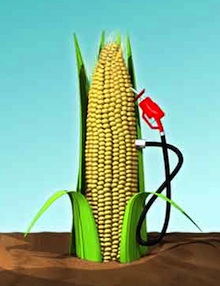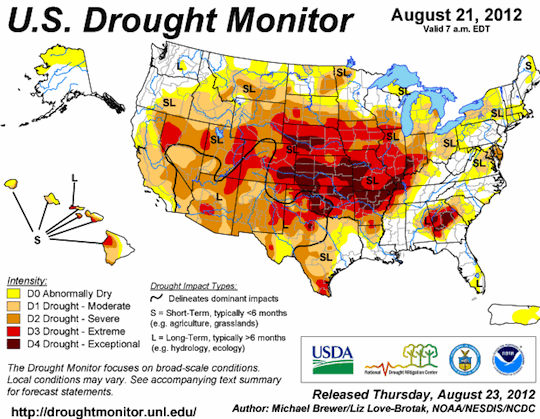Drought Pushes Crop Prices To Record Levels, As We Burn 40% Of Corn Crop In Our Engines
 When will the madness stop? In a piece titled, “Nearly Half Of Corn Devoted To Fuel Production Despite Historic Drought,” Bloomberg editorialized:
When will the madness stop? In a piece titled, “Nearly Half Of Corn Devoted To Fuel Production Despite Historic Drought,” Bloomberg editorialized: Record-high corn prices should be sending a clear message to policy makers in Washington: Requiring people to put corn-based fuel in their gas tanks is a bad idea.
Climate Progress has been saying the same for many years (see “The Fuel on the Hill” and “Let them eat biofuels!”). Bloomberg notes:
The damage is far-reaching. Beef and pork producers are slaughtering their stocks at a record pace to cut use of corn feed that costs two-thirds more than three months ago. This week, President Barack Obama told a campaign rally in Iowa that the federal government will buy $170 million of meat to prop up the market. U.S. cattle herds next year are forecast to be the smallest since 1952, a guarantee of more expensive food in years to come.
Researchers at Texas A&M University have estimated that diverting corn to make ethanol forces Americans to pay $40 billion a year in higher food prices. On top of that, it costs taxpayers $1.78 in subsidies for each gallon of gasoline that corn-based ethanol replaces, according to the Congressional Budget Office.
Burning some 40% of the U.S. corn crop was crazy enough before the record drought, but now it is just plain inhumane. As uber-hedge fund manager Jeremy Grantham put it this month:
Our ethanol policy is becoming the moral equivalent of shooting some poor Indian farmers. Death just comes more slowly and painfully.

What is this drought doing to the breakbasket of the world? AFP reported Tuesday:
US corn and soybean prices closed at new record highs Tuesday as a new survey showed worse-than-expected crop damage from a brutal drought across the country’s central breadbasket…..
“Crops in western Ohio and eastern Indiana were far below the norm,” said Pro Farmer analyst Brian Grete.
Yields in South Dakota meanwhile were called “stunningly low.”
And remember, while this drought may be a record-setter now, if we keep taking no action to reduce carbon pollution, it’ll be the normal climate by my mid-century. By then, humanity will be desperately trying to figure out how to feed another 2 billion people while dealing with extreme weather beyond anything humans have experienced during the period large-scale farming that (barely) fed ever-growing populations. See “Climate Story of the Year Decade: Warming-Driven Drought and Extreme Weather Emerge as Key Threat to Global Food Security.”
As an aside, conservatives like to claim that it is environmentalists who gave us our current biofuels policy, but in fact I never have met an environmentalist who thought we should mandate anywhere near the current amount of corn ethanol.
The only reason environmentalists and clean energy advocates even tolerated energy deals with corn ethanol mandates is the hope that jumpstarting the infrastructure for corn ethanol would pave the way for next-generation cellulosic ethanol. That turned out to be a mistake.
We have gone far beyond what is tenable. Yes, the energy-intensive nature of food production means that oil prices will tend to rise in tandem with food prices, thus increasing the profitability of biofuels. And yes, we are a rich country, the breadbasket of the world, politically far more impervious to higher food prices than higher oil prices.
But as population grows, developing countries’ diets change, and the extreme weather of the last couple of years increasingly becomes the norm in a globally warmed world, food insecurity will grow and our biofuels policy will, inevitably, collapse. It must.
You can return to the main Market News page, or press the Back button on your browser.

